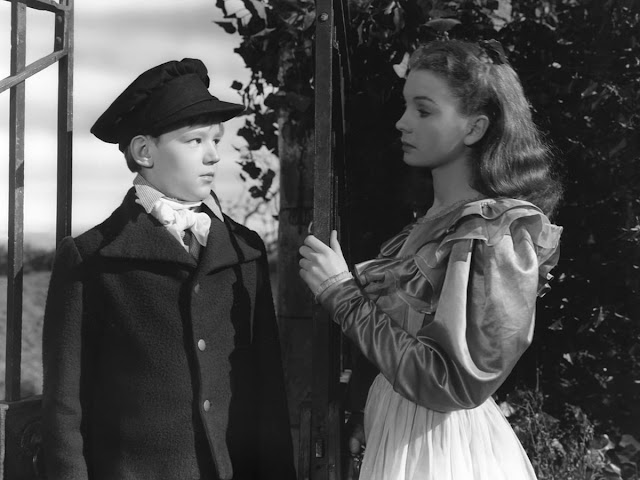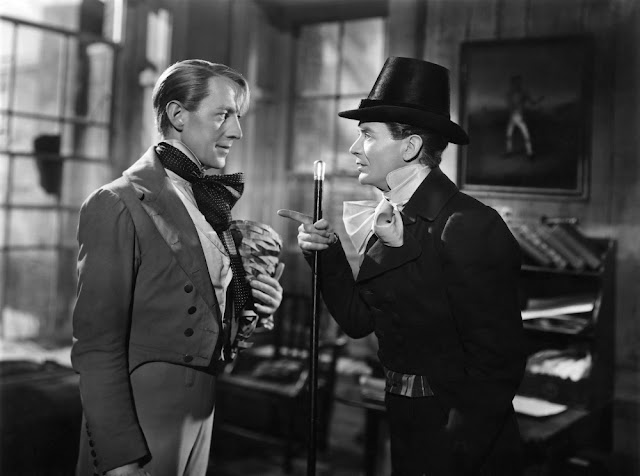Sir Alec Guinness abridged Charles Dickens’ novel Great Expectations into a stage play in 1939, writing the script and playing the part of Herbert Pocket, a young gentleman who teaches the protagonist how to be a gentleman himself. Film director David Lean, who would go on to direct such acclaimed films as The Bridge on the River Kwai, Lawrence of Arabia, and Doctor Zhivago, saw the play performed and wanted to bring it to the screen. What he adapted wasn’t exactly what Guinness had done on stage but was completely rewritten by Lean along with four other writers who, like Guinness before them, took inspiration from the original novel, but slimmed it down to a manageable level for a a sub two-hour film. Two years later Lean would do the same thing again for another Dickens’ story, Oliver Twist.
The story follows Pip (Anthony Wager), a young orphan being raised by his resentful shrew of an older sister and her genteel blacksmith husband, Joe Gargery (Bernard Miles). While visiting the grave of his parents he is captured by escaped convict Abel Magwitch (Finlay Currie) who threatens the boy should he cry out or alert anyone he is there. He tells Pip to return with some tools he can use to remove his chains as well as for some food. Pip returns with the promised items, but sees another convict along the way. Upon hearing this, Magwitch attacks the other man rather than fleeing and is recaptured by the police.
Rich, eccentric spinster Miss Havisham (Martita Hunt) arranges to have Pip come regularly to her mansion to keep her company and to play with her adopted teenaged daughter Estella. Despite her cruel attitude towards him he falls in love with Estelle. These visits continue for many years until Pip turns 14 and has to leave to begin his apprenticeship as a blacksmith. Estella also leaves to become a lady in France. Six years pass and Pip (now played by John Mills) receives a visit from Mr. Jaggers (Francis L. Sullivan) informing him that a mysterious benefactor has offered to make him a gentleman with “great expectations,” complete with a generous allowance and relocating him to London. Pip is not to know the benefactor, nor ask about them but he naturally assumes it to be Mrs. Havisham. He’s trained in being a gentleman by Herbert Pocket (Alec Guinness), a young man he first met at Havisham’s. Years pass by and he finds himself getting too proud for his own good as well as too free with his spending. He also gets reacquainted with Estelle (Valerie Hobson) who has grown into a beautiful but still cold, young woman. When it is finally revealed whom Pip’s benefactor actually is it shakes him to the core and forces him to re-examine his life and how he came by it.
The novel Great Expectations is amongst the greatest works Charles Dickens ever wrote. It is filled with colorful imagery and stark depictions of poverty and prisons. It is a richly detailed look at the disparities between the poor and the wealthy, love, cruelty, depression and death. Like many of Dickens’ works it was published serialized and was highly praised at the time. Contemporary examinations of the novel still find it one of the best examples of British literature and it remains popular still amongst serious readers.
1946 would see the second, and arguably the best, adaptation of the novel to the screen. As mentioned above, this was based on not only the novel but Alec Guinness’s stage adaptation with Guinness returning to the role of Herbert Pocket for the film. By abridging things for the screen many of the novels details were lost. But adapting something as detailed as a Dickens novel would necessitate cutting that down in favor of the basic plot and themes. Lean’s script does a superb job of getting to the bare bones of the story and distilling all of Pip’s internal monologues from the book into moments we can understand without having it narrated aloud. Only in the final half hour do we get some voice over and by then it feels unnecessary and out of place.
John Mills is a good choice as the wide-eyed Pip who starts out as excited for the prospect of becoming a gentleman than becomes a little too complacent. His scene when his adoptive father/brother-in-law Joe comes to visit him shows just how much Pip’s changed in so short a time. Joe is uncomfortable in these surroundings and Pip is uncomfortable and impatient being around the unsophisticated man. This will change as Pip is later humbled again but he is only human and not immune to the trappings of his new station. He still loves Estelle and wants to be with her even when she gets engaged to a wealthy man who wants to take her back to France with him. She’s cold, even to her fiancée, but like Pip she will have her station in life drastically changed. She’s cold, but to a certain extent it is not her fault. She was raised by Mrs. Havisham who intentionally raised her that way to get back at the world.
Like many of Dickens’ stories the ending may or may not be a happy one. Pip and Estelle walk away from the ruins of Mrs. Havisham’s old home, leaving behind all the dust and darkness of that unkempt place. Pip finds Estelle hiding out inside that darkness and forces open the windows, letting in the long absent sunlight exposing all the cobwebs and dust. Estelle, wallowing in her own misery, comes out of her funk and leaves with Pip to parts unknown. Do they stay together or go their separate ways? We are not to know. We can speculate but the film doesn’t tell us.
Great Expectations has been adapted many times since 1946 but none are quite as good as this version. It’s not a perfect adaption of the written word but nothing could live up to that standard. A person unfamiliar with the book will find that the revelation of the mysterious benefactor and how it ties back to Estelle will be quite a surprise, not tipped off too early. Those familiar with the story though will appreciate how this revelation is handled, too, even without the element of surprise. It is perhaps the best possible adaptation of this story that has yet to be surpassed, though many throughout the decades have tried.
Academy Award Nominations:
Best Picture: Ronald Neame
Best Director: David Lean
Best Screenplay: David Lean, Ronald Neame, and Anthony Havelock-Allan
Best Art Direction: John Bryan and Wilfred Shingleton (won)
Best Cinematography - Black and White: Guy Green (won)
____________________________________________________
Release Date: December 16, 1946
Running Time: 118 Minutes
Not Rated
Starring: John Mills, Valerie Hobson, Bernard Miles, Francis L. Sullivan, Anthony Wager and Jean Simmons
Directed By: David Lean









Comments
Post a Comment